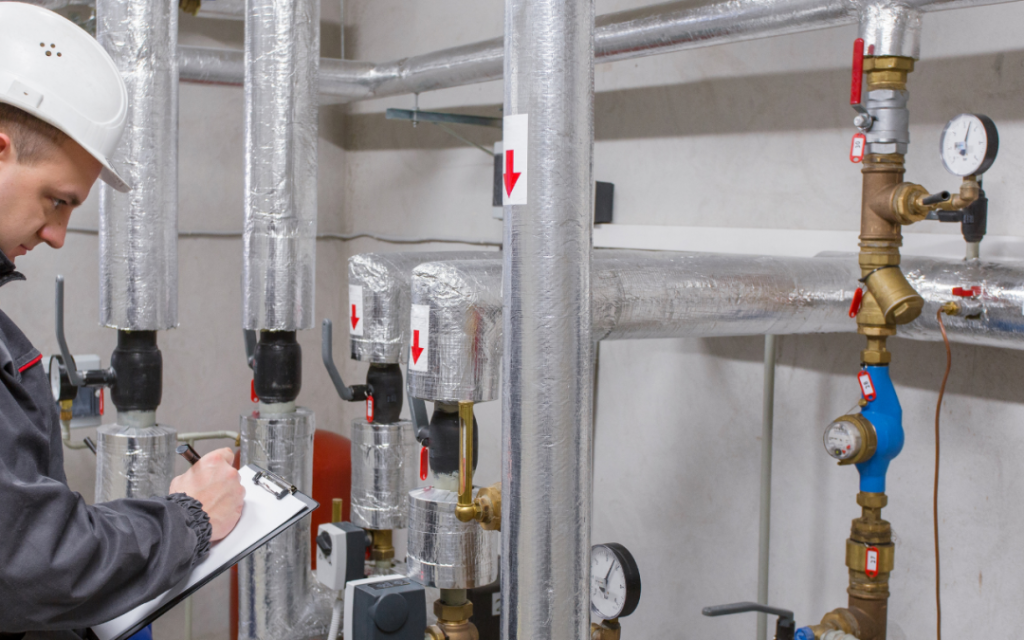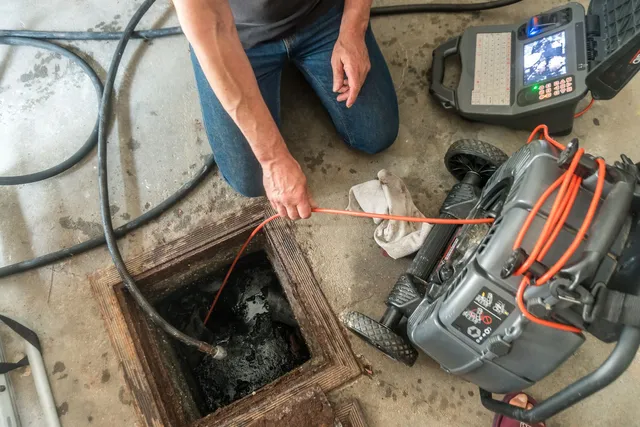In the fast-paced world of business, the last thing you want is an unexpected plumbing disaster. Routine plumbing inspections, especially a professional plumbing inspection, can be the difference between smooth operations and costly disruptions. These regular checks not only prevent major issues but also save your business thousands of dollars over time. In this blog, we'll explore the importance of regular plumbing inspections, the financial benefits, and how these inspections can safeguard your business's bottom line. Ready to dive in and save your business thousands? Let's get started!

The Importance of Routine Plumbing Inspection
Maintaining a healthy and efficient plumbing system is crucial for any business. Routine plumbing inspections play a vital role in achieving this goal by identifying and addressing potential issues before they escalate into major problems. Let’s take a closer look at why these inspections are essential for your business.
1. Preventative Maintenance and Early Detection
Routine plumbing inspections are a form of preventative maintenance that can identify potential problems before they escalate into major issues. For example, a clogged drain can be detected early, preventing extensive and expensive damage to homes. Small leaks, minor blockages, and early signs of wear and tear can be detected during these inspections. By addressing these minor issues promptly, businesses can avoid significant damage and costly repairs.
For instance, a small leak might seem insignificant, but over time, it can lead to water damage, mold growth, and structural issues. Early detection through regular inspections ensures that these problems are fixed before they cause extensive harm.
2. Ensuring Regulatory Compliance
Businesses must adhere to various regulations and standards, including those related to plumbing. Regular inspections ensure that your plumbing system complies with local codes and regulations, helping you avoid fines and legal issues. Non-compliance can result in hefty penalties and, in severe cases, business closures. By staying on top of inspections, you ensure your plumbing infrastructure meets all necessary standards.
3. Enhancing Safety and Health Standards
A well-maintained plumbing system is crucial for maintaining high safety and health standards in your business. It is important to check pressure relief valves in water heater systems to ensure safety. Leaky pipes and faulty plumbing can lead to water contamination, which poses significant health risks to employees and customers. Regular inspections help identify and rectify such issues, ensuring a safe and healthy environment. This is particularly important for businesses in the food and healthcare industries, where plumbing issues can directly impact hygiene and safety.
Financial Benefits of Regular Plumbing Inspection
Beyond preventing disasters, routine plumbing inspections, especially a comprehensive inspection, offer significant financial benefits. From reducing repair costs to lowering utility bills, these inspections can positively impact your business’s bottom line in various ways.
1. Avoiding Costly Emergency Repairs
Emergency plumbing repairs are often more expensive than routine maintenance. It is important to inspect components like the sump pump to avoid costly emergency repairs. When a plumbing emergency strikes, businesses may face additional costs for after-hours service, expedited parts, and extensive labor. Regular inspections help identify potential issues before they become emergencies, reducing the likelihood of unexpected repair costs.
For example, a burst pipe can cause extensive water damage, leading to expensive repairs and potential loss of inventory. By conducting routine inspections, businesses can identify weak spots in the plumbing system and reinforce them before they fail.
2. Reducing Water and Energy Bills
Leaky faucets, running toilets, and inefficient water heaters can significantly increase water and energy bills. Inspecting supply lines is crucial to identify leaks or potential issues within the plumbing system, which can help reduce water and energy bills. During a routine inspection, plumbers can identify and fix these inefficiencies, leading to substantial cost savings. Even small leaks can waste hundreds of gallons of water over time, adding unnecessary expenses to your utility bills. Regular maintenance ensures that your plumbing system operates efficiently, reducing waste and lowering costs.
3. Increasing the Lifespan of Plumbing Systems
Plumbing systems, like any other infrastructure, have a finite lifespan. However, regular maintenance can extend this lifespan significantly. Routine inspections ensure that components are functioning correctly and are not subjected to undue stress or wear. By replacing worn-out parts and performing necessary maintenance, you can avoid premature system failures and extend the life of your plumbing infrastructure. This means fewer replacements and lower long-term costs for your business.

How Pipeline Inspection Minimizes Downtime and Business Interruptions
Plumbing issues can bring your business operations to a screeching halt, causing lost revenue and frustrated customers. Routine inspections help ensure that your plumbing system is in top condition, minimizing the risk of unexpected disruptions.Inspecting sewage lines is crucial to minimize downtime and business interruptions.
1. Keeping Operations Running Smoothly
Plumbing issues can disrupt business operations, leading to downtime and lost revenue. For example, a major leak or sewer backup can force a restaurant to close temporarily, resulting in significant financial losses. Regular inspections help prevent such disruptions by identifying and addressing potential problems before they cause interruptions. By ensuring that your plumbing system is in top condition, you can keep your operations running smoothly and avoid costly downtime.
2. Helping Plan for Off-Hours Maintenance
Regular inspections allow businesses to plan maintenance activities during off-hours, minimizing disruption to daily operations. By identifying potential issues during inspections, you can schedule repairs and maintenance tasks during times when they will have the least impact on your business. This proactive approach ensures that necessary maintenance is performed without affecting customer service or productivity.
Case Studies of Businesses Affected by Plumbing Failures
Consider the case of a small retail store that experienced a severe plumbing failure due to a neglected inspection schedule. Regular inspections of underground water lines are crucial to prevent significant damage. The resulting flood caused extensive damage to the inventory and required the store to close for several days. The repair costs, combined with the lost revenue, amounted to thousands of dollars. Had the store conducted regular plumbing inspections, they could have identified and fixed the issue before it escalated.
Similarly, a hotel that neglected routine inspections faced a significant plumbing disaster when a main sewer line backed up. The incident not only caused damage to several guest rooms but also led to negative reviews and cancellations. The total cost of repairs and lost business was astronomical. These examples highlight the importance of regular inspections in preventing costly business interruptions.
What to Expect During a Plumbing Inspection
During a routine plumbing inspection, a professional plumber will thoroughly examine your plumbing system. For a more detailed assessment, they may use a camera inspection to inspect the insides of pipes. This includes checking pipes, fixtures, water heaters, and drainage systems. The plumber will look for signs of leaks, corrosion, blockages, and other issues that could indicate potential problems. They may also use advanced tools, such as video cameras, to inspect the interior of pipes and identify hidden issues.
Common Issues Identified and Resolved
Common issues identified during plumbing inspections include:
- Leaks: Even small leaks can lead to significant damage over time. Plumbers will check for leaks in pipes, faucets, and fixtures.
- Blockages: Blockages in drains and sewer lines can cause backups and flooding. Plumbers will identify and remove any obstructions.
- Corrosion: Corroded pipes can weaken and eventually fail. Plumbers will inspect pipes for signs of corrosion and recommend replacements if necessary.
- Water Heater Issues: Water heaters are crucial for many businesses. Plumbers will inspect water heaters for signs of wear, leaks, and inefficiencies.
By identifying and resolving these issues during routine inspections, businesses can avoid major plumbing failures and the associated costs.
Advanced Tools and Technology Used in Inspections
Modern plumbing inspections often utilize advanced tools and technology to provide more accurate and comprehensive assessments. Visual inspection plays a crucial role in identifying leaks and checking the integrity of water and sewer fittings.These tools include:
- Video Inspection Cameras: These cameras, including pipe inspection cameras and crawler cameras, are used to inspect the interior of pipes, allowing plumbers to identify blockages, cracks, and other issues that are not visible from the outside.
- Leak Detection Equipment: Advanced leak detection equipment can identify even the smallest leaks, ensuring that they are fixed before they cause significant damage.
- Thermal Imaging: Thermal imaging cameras can detect temperature variations that indicate leaks or inefficient insulation.
- Water Pressure Gauges: These gauges measure water pressure throughout the system, helping to identify issues with water flow and pressure regulation.
By using these advanced tools, plumbers can provide more accurate diagnoses and recommend the most effective solutions.

Best Practices for Routine Plumbing Inspections
To maximize the benefits of routine plumbing inspections, it's essential to follow best practices that ensure thorough and effective maintenance. By implementing a structured approach, training your staff, and partnering with reliable professionals, you can keep your plumbing system in top condition and prevent costly issues down the road. Let's explore the best practices for maintaining your business's plumbing infrastructure.
1. Creating a Maintenance Schedule
One of the best practices for ensuring regular plumbing inspections is to create a maintenance schedule. This schedule should outline when inspections will be conducted and what tasks will be performed. It should also include a checklist of all components to be inspected, ensuring that nothing is overlooked. By adhering to a maintenance schedule, businesses can ensure that their plumbing system remains in optimal condition.
2. Training Staff to Identify Potential Issues
In addition to regular inspections by professional plumbers, it's important to train your staff to identify potential plumbing issues. Staff members should be aware of common signs of plumbing problems, such as unusual noises, slow drains, and water stains. By empowering your staff to recognize these signs, you can address issues before they escalate. Encourage employees to report any concerns immediately, ensuring that problems are addressed promptly.
3. Partnering with Professional Plumbing Services
Partnering with a reputable plumbing service is crucial for ensuring thorough and reliable inspections. A typical home inspection primarily focuses on basic functionality checks, such as ensuring drains operate, toilets flush, and faucets run, which means buyers may overlook the necessity of a more thorough plumbing inspection. Professional plumbers have the expertise and equipment needed to identify and resolve issues effectively. When choosing a plumbing service, look for companies with a proven track record, positive reviews, and appropriate licenses and insurance. Establishing a long-term relationship with a trusted plumbing service ensures consistent and high-quality maintenance for your business.
Conclusion
Regular plumbing inspections are a vital aspect of maintaining a healthy and efficient business. By detecting issues early, ensuring regulatory compliance, and enhancing safety standards, these inspections save your business thousands of dollars in potential repairs and downtime. The financial benefits, combined with the peace of mind that comes from knowing your plumbing system is in top condition, make routine inspections a smart investment. Prioritize regular plumbing checks to protect your business's bottom line and ensure smooth, uninterrupted operations.






